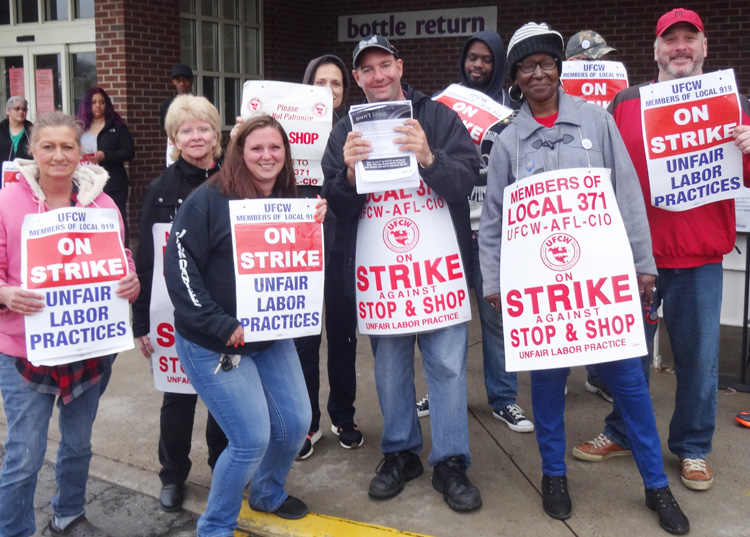BRIDGEPORT, Conn. — The 11-day strike by some 31,000 workers at 240 Stop & Shop stores in Massachusetts, Connecticut and Rhode Island ended April 22 following the announcement of a tentative agreement between company bosses and the United Food and Commercial Workers union. Members of five UFCW locals will begin voting on the contract this week.
The unionists, who had been working without a contract since Feb. 23, walked out over the bosses’ demands for concessions — to cut monthly pension payments, increase workers’ payments for health care benefits, and eliminate Sunday overtime pay.
The strikers’ most popular chant was, “Don’t stop, don’t shop, at Stop & Shop!” They received widespread support from shoppers, the Teamsters and other unionists, and many others, leading to near-empty parking lots at the stores throughout the region.
“The agreement preserves health care and retirement benefits, provides wage increases, and maintains time-and-a half pay on Sunday for current members,” the union said.
The day after the strike ended, Sharadee Lawrence English, a part-time cashier at the Windsor Stop & Shop store, told the Militant that the union’s description of the settlement sounds good, but she wants to see the details.
The majority of workers employed at Stop & Shop are part-time workers, picketers said, and the company, like other grocery and retail bosses, has been trying to drive a wedge between part- and full-time workers, and two-tier divisions between them and future hires.
“Everybody that’s working there is going to get everything they had,” Jeff Bollen, president of UFCW Local 1445 told Bloomberg News. But he admitted the proposed contract would include some cuts for future part-time workers who would no longer get time-and-a-half pay for their first three years when working on Sundays. “I’m not happy that I’m going to have to sit in front of a bunch of members and tell them, ‘Well we promised you no cuts and no givebacks and no concessions,’” working union shop steward Richard Libby told Bloomberg News, “‘but the new hires are going to get them — sorry.’”
“It’s very important to stand up for part-time workers,” Madonna Moreau, who has worked 39 years at Stop & Shop stores and its previous owner, told this worker-correspondent on the picket line in Norwalk April 20.
At the same store, 17-year-old Sean Dwyer, who has been working part time there for six months, pointed to the importance of backing what all workers there have been fighting for. “It’s important to support those who need benefits and vacation pay,” he said. “We all work the same job though we are part-time and not guaranteed the same for doing the same job.”
The strike was effective from the start, with workers showing up for picket duty at their scheduled work shift times.
The power of solidarity
The bosses tried to keep some stores open with management personnel but faced giant problems. “Meat and produce are rapidly disappearing from shelves and aren’t being replaced because truck drivers in the Teamsters union are refusing to cross the picket line,” the Boston Globe reported. Union drivers also refused to pick up garbage from the stores. Departments with time-dated food, like bakery, deli, produce and seafood counters, had to shut down.
Strikers said solidarity from other working people in the community helped put pressure on the company.
“Support is very strong and we really appreciate it,” Angela Shanon, 53, who has been working at Stop & Shop for 23 years, told the Militant on the picket line at the Bridgeport store April 21. Every day volunteers would bring lunch to the strikers, she said. One woman came by the picket line to give a package of fruit and vegetables to the workers.
Stores usually packed with shoppers the week before Easter and Passover were noticeably sparse. Some people who did go into the store told strikers they were just going to the bank inside.
Some rabbis in the area encouraged their congregations not to shop at Stop & Shop, even though these stores offer a broad selection of kosher products. “Any food purchased by crossing a picket line or from scab workers is not kosher for Passover,” Rabbi Jon-Jay Tilsen, spiritual leader of the Conservative Congregation Beth-El Keser Israel in New Haven, told the New Haven Register.
“Customers were great throughout and backed us the whole way,” union shop steward David Alderman told a team of worker-correspondents at a store in Pittsfield, Massachusetts, April 23. He accepted two solidarity cards signed by several workers at two Walmart stores in New York’s Capital Region.
“If there were more grocery stores organizing, it would be a big help when the contracts roll around,” he said.
“A lot of the strike was about the future for new hires,” Stop & Shop bakery worker Becky Robinson, told the Militant there.
Netherlands-based Ahold Delhaize, which owns Stop & Shop, reported profits last year of $2.1 billion.
Tim Craine from Windsor, Connecticut, and Jacob Perasso and Harry D’Agostino in Pittsfield, Massachusetts, contributed to this article.


